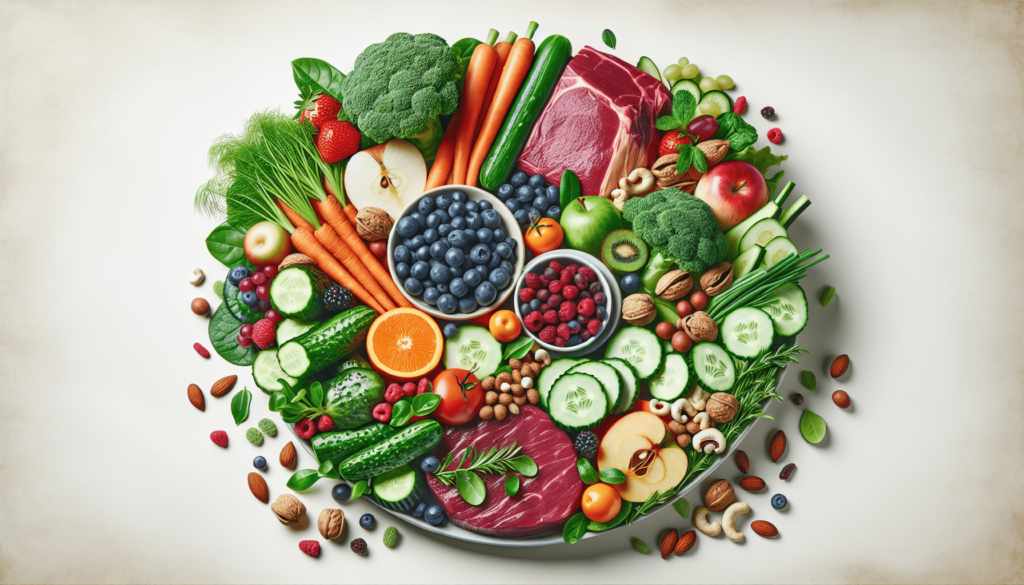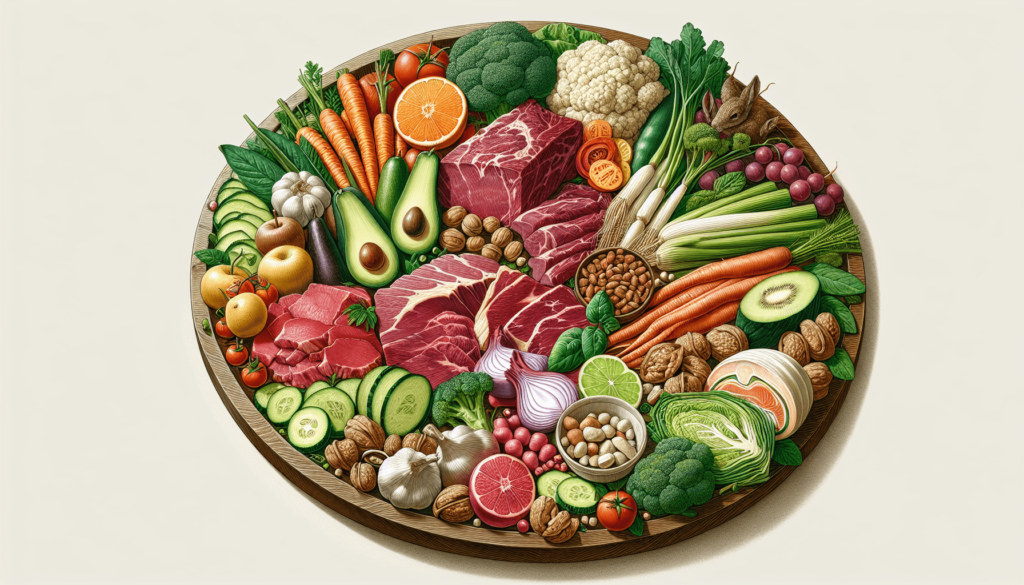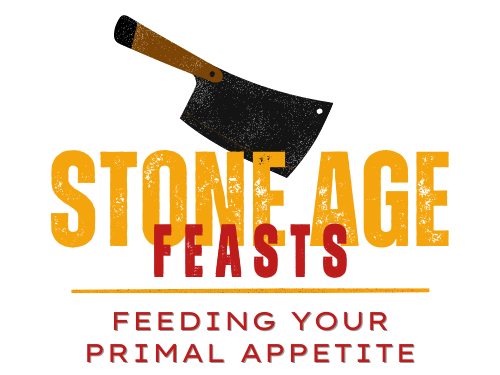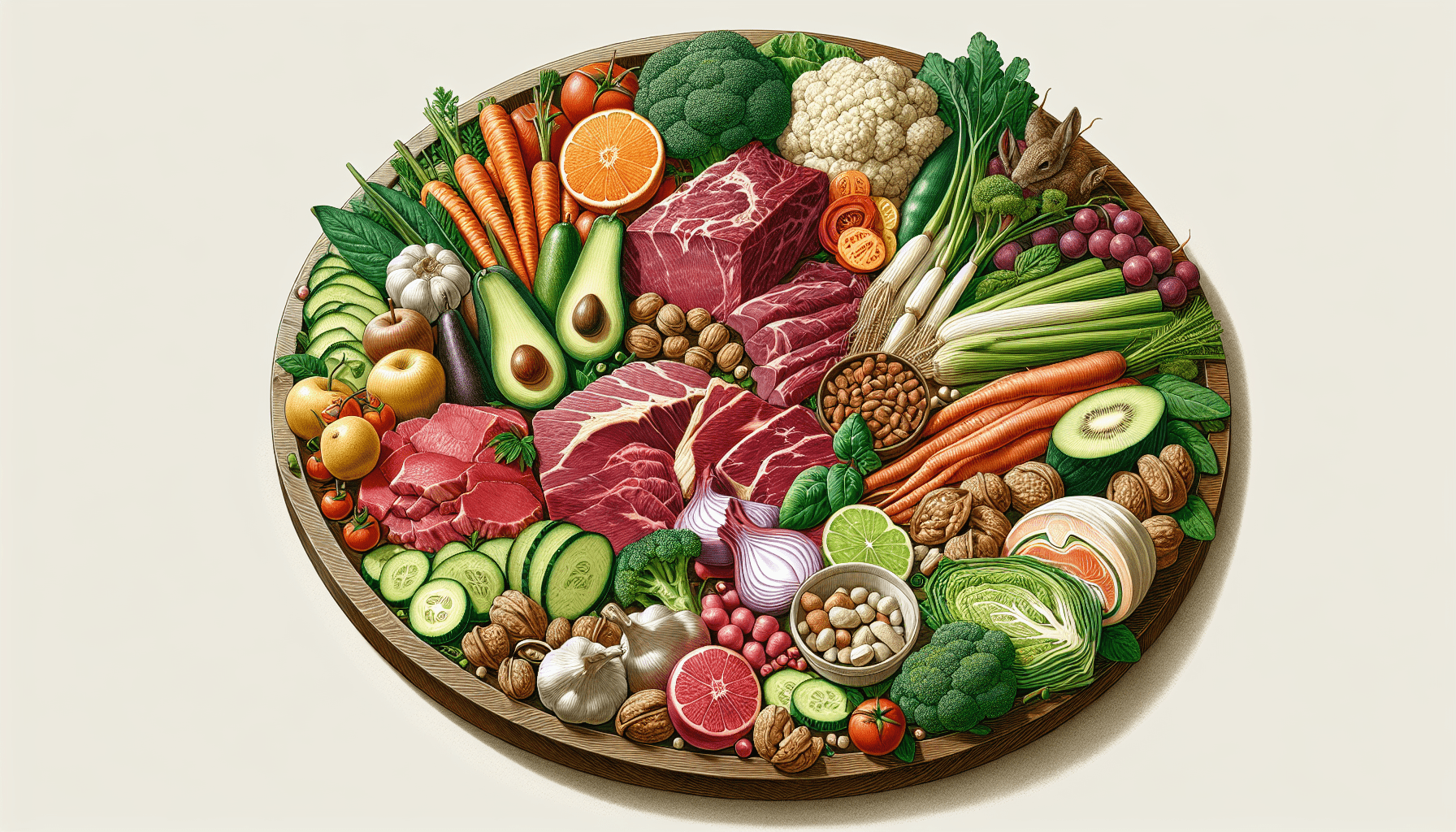Are you curious about what it truly means to eat primal? The Primal Diet, a concept that has been gaining popularity in recent years, embraces the idea of eating the way our ancestors did, focusing on unprocessed, whole foods. By incorporating lean meats, fish, fruits, vegetables, nuts, and seeds into your diet, you can tap into the benefits of this natural and sustainable way of eating. In this article, we will explore the principles behind the Primal Diet, its potential benefits, and how you can begin your journey towards a healthier and more balanced lifestyle.
What is the Primal Diet?
The Primal Diet, also known as the Primal Blueprint or the Paleo diet, is a way of eating that aims to mimic the dietary patterns of our hunter-gatherer ancestors. The focus is on consuming whole, unprocessed foods that are high in nutrients and avoiding modern processed foods that our bodies are not adapted to.
Definition of the Primal Diet
The Primal Diet is based on the belief that our ancestors had a natural diet that consisted primarily of animal proteins, vegetables, fruits, and healthy fats. It eliminates modern processed foods, grains, and legumes, which are believed to cause inflammation and various health issues.
Origin of the Primal Diet
The Primal Diet draws inspiration from the way our ancestors ate thousands of years ago. It is based on the idea that our bodies are genetically adapted to thrive on the foods our ancestors consumed during the Paleolithic era. This diet gained popularity in the early 2000s with the release of the book “The Primal Blueprint” by Mark Sisson.
Key principles of the Primal Diet
The Primal Diet is guided by a few key principles. First and foremost, it emphasizes the consumption of whole, unprocessed foods. This means eliminating all processed and refined foods that have become staples of the modern diet. Secondly, it encourages the intake of high-quality animal proteins, vegetables, and fruits to provide essential nutrients. Lastly, it promotes the consumption of healthy fats and oils, which are believed to be vital for optimal health.
Benefits of the Primal Diet
Weight loss and improved body composition
One of the primary benefits associated with the Primal Diet is weight loss. By eliminating processed foods and refined sugars, this way of eating helps to reduce overall calorie intake and control blood sugar levels. Additionally, the higher protein and healthy fat content of the diet promote satiety and contribute to improved body composition.
Increased energy and mental clarity
By focusing on nutrient-dense foods and eliminating foods that can cause energy crashes, the Primal Diet provides a sustained source of energy throughout the day. Many individuals following this diet report increased mental clarity and improved focus, which can be attributed to the stable blood sugar levels achieved through the consumption of whole foods.
Reduced inflammation and improved gut health
The Primal Diet eliminates grains and legumes, which can be sources of inflammation and digestive issues for some individuals. By reducing inflammatory foods and incorporating plenty of vegetables and fruits, the Primal Diet supports a healthy gut and may help alleviate symptoms such as bloating and discomfort.

Foods to Eat on the Primal Diet
Quality animal proteins
The Primal Diet emphasizes the consumption of high-quality animal proteins such as grass-fed beef, free-range poultry, wild-caught fish, and eggs. These protein sources are rich in essential amino acids, vitamins, and minerals that support optimal health and muscle growth.
Plenty of vegetables and fruits
Vegetables and fruits are essential components of the Primal Diet. They provide fiber, vitamins, minerals, and antioxidants that promote overall health. Leafy greens, colorful vegetables, and low-sugar fruits like berries are particularly encouraged.
Healthy fats and oils
Healthy fats and oils play a crucial role in the Primal Diet. These include sources like avocados, olive oil, coconut oil, nuts, and seeds. These fats provide satiety, support brain health, and help absorb fat-soluble vitamins.
Foods to Avoid on the Primal Diet
Processed foods and refined sugars
Processed foods and refined sugars are a major no-no on the Primal Diet. These include foods like sugary snacks, sodas, fast food, and packaged meals. They are devoid of nutrients and can contribute to weight gain, inflammation, and various health issues.
Grains and legumes
Grains such as wheat, corn, rice, and legumes like beans and lentils are not a part of the Primal Diet. They contain anti-nutrients and can cause digestive problems for some individuals. Eliminating these foods may alleviate issues like bloating and gas.
Industrial seed oils
Industrial seed oils, including soybean oil, canola oil, and corn oil, are highly processed and loaded with unhealthy omega-6 fatty acids. These oils are to be avoided on the Primal Diet due to their inflammatory effects on the body.

Meal Planning on the Primal Diet
Building balanced meals
Aim to create meals that include a protein source, plenty of vegetables, and a serving of healthy fats. For example, a meal could consist of grilled chicken breast, a side of roasted vegetables, and a drizzle of olive oil.
Sample meal plan for a day
- Breakfast: Vegetable omelet cooked in coconut oil with a side of mixed berries.
- Lunch: Grilled salmon with a large salad dressed in olive oil and vinegar.
- Dinner: Grass-fed beef burger wrapped in lettuce with sweet potato fries cooked in coconut oil.
- Snack: A handful of nuts or sliced vegetables with guacamole.
Tips for meal prepping
To make meal planning on the Primal Diet easier, consider dedicating some time each week to meal prepping. This involves preparing and portioning out meals and snacks in advance, making it convenient to stick to the diet even during busy days. Preparing and storing meals in glass containers can help keep them fresh and easily accessible.
Exercise and Lifestyle on the Primal Diet
The importance of movement and exercise
The Primal Diet not only focuses on nutrition but also promotes an active lifestyle. Regular exercise, including both strength training and cardiovascular activities, is crucial for overall health and fitness. Engaging in physical activity helps maintain muscle mass, boost metabolism, and improve cardiovascular function.
Primal movement patterns and exercises
The Primal Diet encourages the incorporation of primal movement patterns, such as walking, running, lifting, carrying, and climbing. These natural movements closely resemble the activities our ancestors performed in their daily lives. Additionally, exercises like bodyweight workouts, resistance training, and high-intensity interval training (HIIT) complement the Primal lifestyle.
Implementing lifestyle changes
Alongside dietary changes, the Primal Diet encourages adopting a holistic approach to overall well-being. This may include practicing stress-reducing techniques like meditation or yoga, prioritizing sufficient sleep, optimizing sunlight exposure, and fostering social connections.
Potential Drawbacks and Considerations
Nutrient deficiencies
While the Primal Diet promotes nutrient-dense foods, there is a risk of potential nutrient deficiencies if certain food groups are eliminated without appropriate substitutions. It is essential to ensure adequate intake of vitamins and minerals through careful food selection or considering appropriate supplements.
Sustainability and ethical concerns
The Primal Diet places a heavy emphasis on animal products, which may raise sustainability and ethical concerns for some individuals. It is important to choose sustainably and responsibly sourced animal products to minimize environmental impact. Alternatively, individuals may choose to focus on plant-based Primal alternatives.
Individual variability and customization
Every individual is unique, and what works for one person may not work for another. It is crucial to listen to your body and make necessary adjustments to the Primal Diet to suit your specific needs. Consulting with a healthcare professional or a registered dietitian can provide personalized guidance.
Evidence and Criticisms of the Primal Diet
Scientific studies supporting the Primal Diet
There is a growing body of scientific evidence supporting the Primal Diet and its potential benefits. Studies have suggested that a Primal-like diet can lead to weight loss, improved blood sugar control, and decreased cardiovascular risk factors.
Contradictory research and criticisms
Contradictory research and criticisms of the Primal Diet mainly stem from the limited long-term studies and potential challenges in meeting all nutrient needs. Critics argue that the exclusion of certain food groups may lead to deficiencies and question the theory of consuming diets that reflect our ancestors’ eating habits.
Expert opinions
Opinions among experts vary regarding the Primal Diet. Some experts believe that the concept of focusing on whole, unprocessed foods aligns with sound nutrition principles, while others caution against the elimination of entire food groups without sufficient evidence. It is always prudent to consult with a healthcare professional or registered dietitian to evaluate individual circumstances.
Getting Started with the Primal Diet
Gradual transition vs. cold turkey approach
When starting the Primal Diet, individuals have the option of gradually transitioning or taking a cold turkey approach. The gradual transition allows for a smoother adjustment and can help individuals identify potential food sensitivities. The cold turkey approach involves completely eliminating non-Primal foods from day one.
Stocking the pantry with Primal staples
To set yourself up for success on the Primal Diet, it’s advisable to stock your pantry with Primal staples. These may include high-quality meats, eggs, vegetables, fruits, nuts, seeds, and healthy oils like olive oil and coconut oil. Having these ingredients readily available will make it easier to prepare Primal-friendly meals.
Seeking guidance and support
If you’re new to the Primal Diet, seeking guidance from experts or joining support groups can be beneficial. Registered dietitians, nutritionists, and online communities can provide valuable information, tips, and support throughout your Primal journey.
Maintaining the Primal Diet Long-Term
Creating a sustainable and enjoyable eating plan
To maintain the Primal Diet in the long term, it is crucial to create a sustainable and enjoyable eating plan. This involves finding a variety of Primal recipes and experimenting with different flavors and cooking methods. Incorporating occasional indulgences and social meals while staying true to the Primal principles can contribute to a balanced and sustainable approach.
Finding Primal-friendly dining options
Eating out while following the Primal Diet may require some planning, but it is definitely possible. Look for restaurants that offer quality meat and seafood options, as well as plenty of vegetable side dishes. You can also customize your orders to fit your Primal preferences by requesting substitutions or modifications.
Handling social pressures and temptations
When following the Primal Diet, it’s important to anticipate and prepare for social pressures and temptations. Communicating your dietary preferences to friends and family can help them understand and support your choices. Bringing your own Primal-friendly dishes to gatherings or suggesting restaurants that offer suitable options are ways to navigate social situations and stick to your dietary goals.
In conclusion, the Primal Diet provides a framework for a healthy and natural way of eating. By focusing on whole, unprocessed foods, quality animal proteins, and healthy fats, this diet can support weight loss, increased energy, and improved overall health. While individual considerations and potential drawbacks exist, with proper planning, support, and customization, the Primal Diet can be a sustainable and enjoyable way of nourishing your body.

I’m James Gheen, the creator behind StoneAgeFeasts.com – the ultimate destination for exploring the wonders of the Paleo diet. Feeding Your Primal Appetite is not only our tagline, but also our mission. Through our platform, I bring the ancient wisdom of the Stone Age into the modern kitchen, offering a treasure trove of recipes that prioritize whole, unprocessed foods. With succulent meats, fresh seafood, and an abundance of fruits and vegetables, StoneAgeFeasts.com celebrates the simplicity and purity of Paleo eating. Whether you’re a seasoned enthusiast or new to this lifestyle, join me in rediscovering the joy of eating naturally and wholesomely on StoneAgeFeasts.com.

